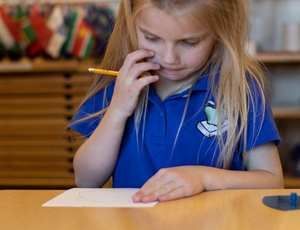In a Montessori environment, the adult puts more attention and value on the process rather than the product. We value the effort and repetition of actions that lead to a result. We aim to motivate children to enjoy the process, to make it joyful and natural for them instead of putting pressure on a specific product or result. This is sometimes challenging with young children, for instance, when we find ourselves waiting for our toddler to put on his shoes for five minutes, and he ends up putting it on the wrong foot. There is a lot of preparation that we need to appreciate and protect, especially the processes our children are going through. In this month’s article, we will discuss why the process is more important than the product and how, if there is a positive natural process, the result will be a positive one as well.We all want our children to learn as much as they can, and we have good intentions when we set goals for them, but it is rare that we stop and think about how they feel when they notice we are waiting for a specific outcome of an activity during a particular time frame.
Repetition is an innate tendency all humans have, especially when we are very young. Since everything is new to young toddlers, they want to have as much experience as they can with what is available in the environment. This means they will enjoy repetition, and if they are interrupted, they may not be able to master that particular skill. Every time they repeat an action, they are perfecting it, and every time is different.
Allowing children to repeat and perfect their skills means that we will witness many errors, and that is entirely normal; it is even positive. We tend to associate errors with negativity, when in fact, we all make errors. It is part of our reality. No matter our age, we all err. If we want to perfect something, we must look into our errors to identify what we can improve.
That is why the process is so important. When a child enjoys the process and is free to be in that process as much as he needs, he naturally will have a positive result from it. Once a child goes through the entire process and has a product, then he will be able to consciously self-correct his actions without the need of an adult.
The ability to accurately evaluate one’s performance is critical to self-correction, and we can foster this from the time children are very young. We must give children neutral feedback about their actions without labeling them as negative or positive. The more accurate we are when describing what happened, the easier it is for the child to identify what he needs to either change or continue. For instance, if your child is pouring a glass of water and the water spills on the countertop, we avoid giving negative feedback. This type of feedback does not give the information needed for the child to understand what needs to be modified so it won’t happen again. In addition, we are putting the child on the spot and adding an emotional context that might discourage him from trying again. Instead, we can offer accurate feedback like: “That was a lot of water; next time you can try to pour it slowly so you can see when to stop.” This type of feedback acknowledges what happened, but it also gives key information to the child about what went wrong and how to improve it without making him feel guilty or ashamed of what happened.
Accurate feedback can be given not only when we err, but also in favorable situations. For instance, your child is carrying a glass of water from the countertop to the table, and he does not spill it. Avoid phrases like “Good job carrying the glass,” since it does not give any useful information. Instead, tell him “You carried the glass slowly without spilling a single drop!” In this case, the child can use that piece of information in the future to evaluate his own performance.
Another advantage of this kind of feedback is that it allows the child to rely on himself for good feelings about his performance instead of relying on the phrasing or punishing of the adult.
We must understand and be at peace with the reality that children will have many mistakes in their journey to master a skill, and that it is okay. We must offer children plenty of opportunities to know if they did something correctly or incorrectly, and in either case, it’s no big deal. If they get it wrong, that is okay; if they get it right, that is okay as well. If it is the former, you move on. If it’s the latter, you try again. Either way, learning will occur.
Quote of the Month
"This is the secret: we must walk with the child and not the child with us."
-Maria Montessori (London, 1946)
Item of the Month
Lacing Exercise by Montessori Services
This exercise allows children to learn the practical skill of lacing and sewing, as well as practicing precision and exactness. Show your child how to use it with slow movements of your hands, and letting him repeat it as many times as he needs. Once he masters the use of the thick needle, you can try giving him a thinner one. Prepare plenty of pre-cut squares of fabric for him to choose from.
Link to buy it at Montessoriservices.com
https://www.montessoriservices.com/lacing-exercise
Have a Little extra Time?
Edison and Cylinders I – YouTube Video
In this two-minute video, you will see a 16 months old boy working with a Montessori material named Knobbed Cylinders. The material has ten cylinders, and each cylinder has a different thickness and height. The goal of the material is to fit each cylinder in the matching hole. At some point, the boy notices that he has misplaced one or more of the cylinders. Patiently, without frustration and without any adult intervention, he fixes the cylinders until it’s correct. This kind of patient is possible only if the child knows how to self-correct. Enjoy!
Link to watch the video at YouTube.com
https://www.youtube.com/watch?v=G67s0Ip_1Cg&feature=youtu.be



